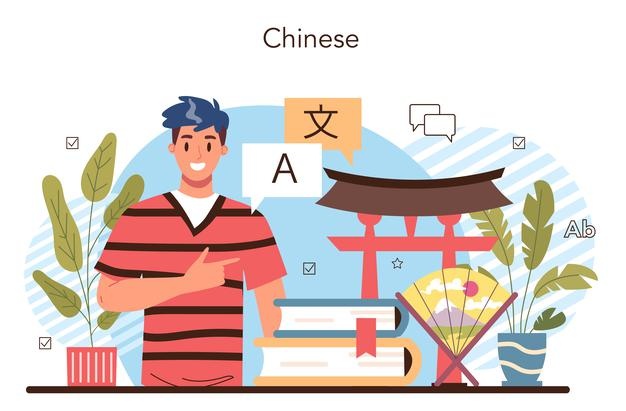The bad news: China won’t stop its zero-Covid policy anytime soon (or will it?). The good news: you don’t have to go to China to learn Chinese.
Ask anybody what’s the best way to learn Chinese and they’ll probably tell you should visit the third largest country in the world and stay there for an extensive period of time for travel, work or study. “Your Chinese will improve so fast!”, several people told me before I left for a 5-month stay on Chinese territory. And you know what? That was true! And I’ve never doubted the power of immersion when it comes to taking your skills in any foreign language to the next level. As a matter of fact, I always believed it a necessary step at a certain point: to speed up the learning process and make the best use of your time. But is immersion in China really that essential to learn Chinese? After all, online resources for learning Chinese are abundant and it has become so much easier to connect to Chinese speaking people and other learners.
Will Hart – got fluent in Mandarin without visiting China

The case of British med student Will Hart provides real proof that it’s possible to learn Mandarin while staying at home. Not without reason is he a sensation in the online Chinese learning community: he got fluent in Mandarin within 1.5 years and did so without ever visiting China! On YouTube you can find several Chinese interviews where he not only converses freely in fluent Chinese, but also sounds native-like. Like I mentioned in a previous post, the vocabulary he uses to describe his Chinese learning experience is elaborate and precise to the point it’s uncanny. How can a normal person manage that within 18 months?
How did he do it?
Listening to his story, several points caught my attention:
- The pandemic forced him to stay at home with lots of time on his hands. Normal student life was reduced to zero.
- Will practiced speaking from day one, including speaking to himself (“自言自语”).
- He had Chinese friends to speak with, meaning the language was a communication tool from the start. At least one of this friends seems almost like a language tutor to him.
- To make communication work he focused on pronunciation and getting the tones right, his Chinese friends proving immediate feedback. He spent hardly any time on handwriting characters.
- Obviously Will possessed the discipline & dedication to keep investing time and energy in learning Chinese. I guess having Chinese friends to speak with helped him to maintain a sense of purpose, keeping it real.
- He develops efficient reviewing habits using his own Anki flashcards and spaced repetition.
- He is very curious, challenges himself and has the ability to keep language learning interesting by picking topics that fascinate him (跟着兴趣走)
What amazes me the most
One might say learning Chinese to a high level within 1 or 2 years is not unique. With the help of intensive study programs and experienced teachers serious learners can achieve great results. In a post called How long does it take to get HSK 6? I mention the cases of two extremely fast students who passed HSK 6 in respectively one and two years. I’d say – regardless of study time in hours – that’s fast. In that sense, Will is not completely alone, although his speaking skills might surpass the others.
Apart from never setting foot on Chinese soil, I’m not sure what amazes me the most – the fact that he never used any coursebook as a guideline or that he didn’t bother to visit a Chinese course and chose to 100 percent self-study instead. Because without coursebooks or teachers you’re really on your own. Where to begin? How to find your way? How not be overwhelmed by all available online resources and their difficulty? Although I believe in autonomous learning (and this blog is mostly about self-studying Chinese), I’m pretty sure that most people wouldn’t get very far without outside help (from a teacher) or at least some kind of framework to follow. You’d probably be wasting time to figure out where to begin and finding the ways and methods to study effectively, according to your own needs and situation. So if someone like Will figures out the language and also independently acquires the skills and means to study it effectively, that’s truly outstanding.
Is that the whole story?
So obviously Will was doing many things right, but is this the whole story? Can others produce the same results by applying these learning methods? Honestly I think two points haven’t been stressed enough. One is daily studying time. So far we mentioned 1.5 years, but how many hours did Will study Chinese on a daily basis? One hour, four hours, eight hours? This obviously makes a huge difference. I’m not completely sure, but it seems to me that he was spending lots of time on Chinese, studying both passively as actively. It’s a very different situation from – say – someone who studies a couple of hours after work every week and hasn’t got the time to watch Chinese TV-shows.
The second point are teachers and tutors. Having Chinese friends or tandem partners that are willing to speak their native language with you can be a key to success, yet – in my view – you still need a teacher or tutor to show you the way. So my guess would be that at least one of his Chinese friends played such a role. I might be wrong of course. Lots of helpful advise for self-studying Chinese can be found online, although you’d have to be a polyglot genius to figure everything out without losing precious time. You can prevent that with a tutor to guide your way and a Chinese environment to communicate with. It seems to me that Will’s case matches these criteria.
What about special talent?
Can Will’s Chinese learning success be explained by a superb talent for languages? Although this guy is obviously very gifted and intelligent, to me that sounds too easy. What does special talent for languages even mean? Will also points out that his experience learning Spanish in school was more or less a disaster, so I don’t think it all comes natural to him. If so, he’ll probably be learning Icelandic next year, and Hebrew the year after, just for sports.
But if he does possess a special talent, what is it? Could it be “tolerance of ambiguity and discomfort”? Most people feel very uncomfortable speaking a foreign language, especially when they’re almost complete beginners, because they feel they are making a constant fool of themselves. They’re afraid of making mistakes, not understanding, of communication breakdown happening. They don’t enjoy undercutting their intellectual level, not being able to express themselves fully and freely. Typically they hate it when they can’t understand everything at once and there’s no precise English translation available. I don’t know, but my guess is that Will is the complete opposite: he must have an unusual high degree of tolerance of all these things.
Conclusion
Wrapping it up here: you don’t have to go to China to learn Chinese, yet it’s hard to reproduce the special conditions that made Will’s learning journey successful. The discussion on Reddit shows that cases like his can be both discouraging and inspirational. As always we have to remember there’s no miracle method and we probably don’t have the full picture. Instead of thinking “damn, I must be doing it all wrong”, we should be asking which of his approaches could be working for us as well.

